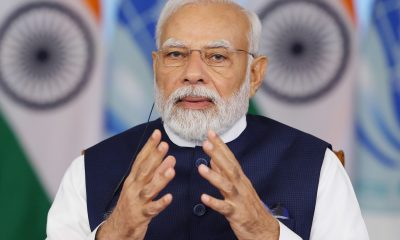Canada News
A year later, Liberals are busy consulting, but are they truly listening?
OTTAWA—Justin Trudeau’s Liberals swept to power last October with a promise of a more open government that better reflects the values and expectations of Canadians.
A year later, they’re getting credit for a willingness to listen. But it’s too early to tell whether that is resulting in decisions and policies the public truly wants.
The Liberals have launched a flurry of consultations on matters big and small. At last count, there were 84 consultations accepting online comments about everything from food additives and species at risk to a national housing strategy and security policy.
Townhall meetings on electoral reform have taken place across the country, and a special task force is gathering views on a legalized marijuana regime.
The Liberals say they’re fulfilling the pledge to include Canadians in decision-making through several means, including discussion papers, surveys, online portals for written submissions, public meetings, regional and national roundtables, social media, teleconferences and webinars.
“The many open consultations are an opportunity for everyone to be involved in the discussions that shape and inform public policy decisions, and share their ideas,” said Cameron Ahmad, a spokesman for Trudeau.
Many say the active solicitation of public input stands in sharp contrast to the top-down control of the previous Conservative government under Stephen Harper. The question is whether the change in style will be matched by one in substance.
There’s evidence that the more a party can appear to be governing on the basis of a broad consensus, the higher its polling numbers tend to be, said Paul Thomas, professor emeritus of political studies at the University of Manitoba.
“In this day and age, conflict is not regarded favourably by the public,” Thomas said. “They think there’s too much mindless, partisan conflict in the political world. And they would like to see governments identify the public interest by listening to the public more.”
Critics of consultation deride the process as a public-relations exercise that makes people feel good but has no impact on actual policy. Some say it’s simply a time-buying ploy that allows the government to delay a tough decision on a divisive topic.
For the NDP, the controversial anti-terrorism legislation known as Bill C-51 is a prime example.
The Liberals promised during the election campaign to fix several specific “problematic elements” of the law. The NDP has chastised the government for embarking on a full national security review before changing even a single line of the legislation.
Public Safety Minister Ralph Goodale recently defended the Liberals’ unhurried approach, saying the government wants to take the necessary time to “get this right” after the Conservatives rushed legislation onto the books without properly consulting Canadians.
“A lot of people felt shut out, and we promised to give them the opportunity to be heard.”
Accountability can be built into the process by “reporting back” to the public on what was heard and how the feedback was used in decision-making, said Paul Howe, a political science professor at the University of New Brunswick.
Federal agencies have promised to publish such reports, though they generally take many months to prepare and release.
Still, that does not guarantee the advice considered by decision-makers is truly indicative of public sentiment.
“How representative are those people who go online and contribute to discussions that are taking place in cyberspace?” asked Thomas. “And how do you integrate that kind of public feedback with the expert advice that’s coming from the specialists inside government?
“It’s a very tricky exercise.”
After attending more than a dozen townhalls on electoral reform, Democratic Institutions Minister Maryam Monsef said there was no consensus on the precise voting system that should replace Canada’s current first-past-the-post system.
NDP democratic reform critic Nathan Cullen, on the other hand, said NDP townhalls had found overwhelming support for some form of proportional representation.
The Conservatives, meanwhile, are demanding a referendum on any electoral changes.
The experience illustrates the pitfalls of the Liberal approach, said Duff Conacher, a founder of the accountability group Democracy Watch.
The government is conducting plenty of “squeaky-wheel consultations” — like the ones on electoral reform — that attract people with strong views on a given subject, Conacher said. But the Liberals promised a government that better reflects the beliefs and expectations of Canadians.
“You can’t do that unless you know what Canadians’ values are,” he said. “And you can’t know that unless you do a meaningful, demographically representative consultation.”
Conacher advocates a more rigorous process — common in Sweden — known as the study circle.
The concept involves an independent administrator randomly selecting about 1,500 Canadians who are statistically representative of the population, divided into 75 groups of up to 20 people apiece.
Each group meets four or five times over the course of several weeks to learn about, discuss and ultimately answer neutral questions on an issue. The overall results are then tabulated to reflect the entire pool of participants.
The process is more effective than a telephone survey, where someone might provide answers without knowing anything about the subject, Conacher said. It’s also more representative than holding a single citizen assembly of as many as 200 people, the results of which can be skewed by charismatic participants, he added.
Democracy Watch helped the Liberal government of Jean Chretien employ the study circle technique during immigration consultations more than 20 years ago. Conacher has tried — unsuccessfully so far — to generate renewed enthusiasm for the concept.
The Liberals are “always open to new ideas on how we consult,” said Ahmad, but he insisted the government is already ensuring space for a broad range of Canadians.
Ahmad pointed to the government’s “Innovation Agenda” consultations, which began with a discussion paper and background presentation and generated considerable online buzz through social media as well as ideas from more than 1,000 people.
As part of the process, 10 innovation leaders led 30 roundtables involving 400 participants.






















